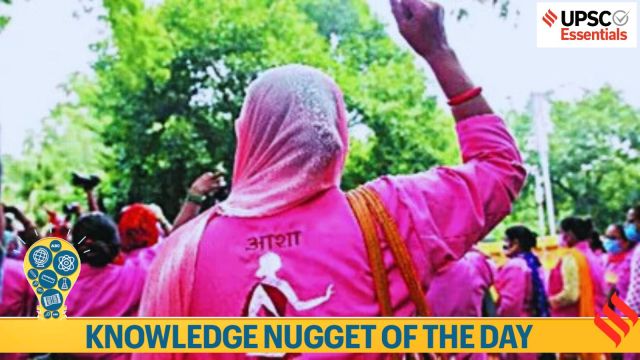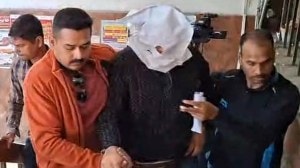
Why in the news?
Congress MPs from Kerala protested outside Parliament on Tuesday (March 11), demanding increased honorariums and retirement benefits for ASHA workers. Notably, a section of ASHA workers in Kerala has been protesting, seeking an increase in their honorarium to ₹21,000 per month and a one-time payment of ₹5 lakh as retirement benefits. Meanwhile, Health Minister J P Nadda informed the Rajya Sabha that the Steering Group of the National Health Mission (NHM) has approved increased incentives for ASHAs, which will come into effect soon.
Key Takeaways :
1. Accredited Social Health Activists, or ASHAs, are volunteers from within the community who are trained to provide information and aid people in accessing benefits of various healthcare schemes of the government.
2. ASHAs act as a bridge connecting marginalised communities with facilities such as primary health centres, sub-centres and district hospitals.
3. The National Rural Health Mission (NRHM), launched in 2005, established ASHAs as a new group of community health workers who would operate in rural areas alongside the anganwadi workers (AWWs) of the Integrated Child Development Scheme (ICDS). (Note: In 2013, NRHM and National Urban Health Mission were subsumed in the National Health Mission)
4. An ASHA is typically a woman who resides in the village she serves, aged between 25 and 45 years. Preference is given to married, widowed, or divorced women, and those who have completed education up to Class 10.
Story continues below this ad
5. Notably, the NHM sees ASHAs as volunteers and not employees, which makes them ineligible for earnings beyond task- or activity-based incentives.
6. ASHA workers receive a nominal honorarium along with various incentives. The honorarium varies from state to state. The irregular payment of honorarium and incentives, which triggered the current protest in Kerala, has been a persistent issue.
7. Both the state and central government contribute to the payment of ASHA workers, with the centre’s share being critical to run it.
What duties are entrusted to ASHA workers?
1. ASHA workers go door-to-door in their designated areas creating awareness about basic nutrition, hygiene practices, and the health services available. They focus primarily on ensuring that women undergo ante-natal check-up, maintain nutrition during pregnancy, deliver at a healthcare facility, and provide post-birth training on breast-feeding and complementary nutrition of children. They also counsel women about contraceptives and sexually transmitted infections.
Story continues below this ad
2. ASHA workers are also tasked with ensuring and motivating children to get immunised. Other than mother and child care, ASHA workers also provide medicines daily to TB patients under directly observed treatment of the national programme.
3. They are also tasked with screening for infections like malaria during the season. They also provide basic medicines and therapies to people under their jurisdiction.
4. The ASHA’s are also tasked with informing their respective primary health centre about any births or deaths in their designated areas.
BEYOND THE NUGGET: National Health Mission (NHM)
1. The NHM was launched as National Rural Health Mission (NRHM) by central government in 2005. In 2013, the Centre included the urban component .i.e. National Urban Health Mission (NUHM) in the mission and NRHM was rebranded as the National Health Mission, consisting of two sub-missions: NRHM and NUHM.
Story continues below this ad
2. The main program components include Health System Strengthening, Reproductive, Maternal, Neonatal, Child, and Adolescent Health (RMNCH+A), as well as Communicable and Non-Communicable Diseases.
 In January this year, the Cabinet gave its nod to continue the mission for the next two years.
In January this year, the Cabinet gave its nod to continue the mission for the next two years.
3. The National Health Mission aims to achieve universal access to equitable, affordable, and high-quality healthcare services that are accountable and responsive to the needs of the population.
4. In January this year, the Union Cabinet reviewed the progress under the National Health Mission over the last three years and was informed that with significant progress towards achieving the Sustainable Development Goals (SDGs), India is on track to meet its health targets well ahead of the 2030 deadline.
5. The Cabinet gave its nod to continue the mission for the next two years. The Cabinet was also apprised of accelerated decline in maternal mortality rate, infant mortality rate, under 5 mortality rate and total fertility rate and the progress in respect of various diseases programmes like TB, malaria, kala-azar, dengue, tuberculosis, leprosy, viral hepatitis etc. and new initiatives undertaken such as National Sickle Cell Anaemia Elimination Mission.
Story continues below this ad
Post Read Question
With reference to the National Rural Health Mission, which of the following are the jobs of ‘ASHA’, a trained community health worker? ( UPSC CSE 2012)
1. Accompanying women to the health facility for antenatal care checkup
2. Using pregnancy test kits for early detection of pregnancy
3. Providing information on nutrition and immunisation.
4. Conducting the delivery of baby
Select the correct answer using the codes given below:
(a) 1, 2 and 3 only
(b) 2 and 4 only
(c) 1 and 3 only
(d) 1, 2, 3 and 4
Read More:
Behind ASHA protests in Kerala: Demand for increased honorariums, other benefits
Explained: Who are ASHA workers, the women healthcare volunteers honoured by WHO?
Story continues below this ad
ASHA workers are still not ‘workers’. This is the problem
India on track to meet SDG health targets well ahead of 2030: Govt
🚨Union Budget 2025 special: Click Here to read the February 2025 issue of the UPSC Essentials monthly magazine. Share your views and suggestions in the comment box or at manas.srivastava@indianexpress.com🚨
Subscribe to our UPSC newsletter and stay updated with the news cues from the past week.
Story continues below this ad
Stay updated with the latest UPSC articles by joining our Telegram channel – Indian Express UPSC Hub, and follow us on Instagram and X.



 In January this year, the Cabinet gave its nod to continue the mission for the next two years.
In January this year, the Cabinet gave its nod to continue the mission for the next two years.






























